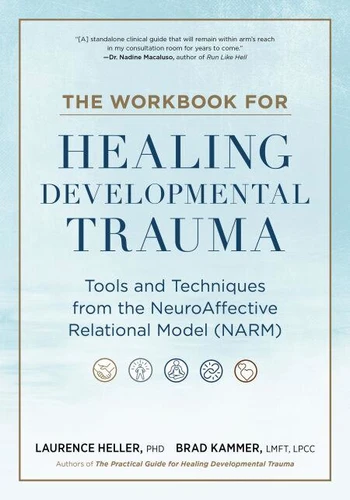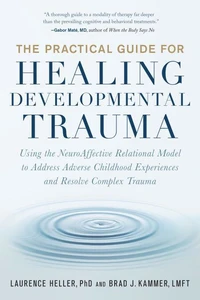Nouveauté
The Workbook for Healing Developmental Trauma. Tools and Techniques from the NeuroAffective Relational Model (NARM)
Par : ,Formats :
Disponible dans votre compte client Decitre ou Furet du Nord dès validation de votre commande. Le format ePub protégé est :
- Compatible avec une lecture sur My Vivlio (smartphone, tablette, ordinateur)
- Compatible avec une lecture sur liseuses Vivlio
- Pour les liseuses autres que Vivlio, vous devez utiliser le logiciel Adobe Digital Edition. Non compatible avec la lecture sur les liseuses Kindle, Remarkable et Sony
- Non compatible avec un achat hors France métropolitaine
 , qui est-ce ?
, qui est-ce ?Notre partenaire de plateforme de lecture numérique où vous retrouverez l'ensemble de vos ebooks gratuitement
Pour en savoir plus sur nos ebooks, consultez notre aide en ligne ici
- Nombre de pages160
- FormatePub
- ISBN8889842880
- EAN9798889842880
- Date de parution04/11/2025
- Protection num.Adobe DRM
- Taille3 Mo
- Infos supplémentairesepub
- ÉditeurNorth Atlantic Books
Résumé
A comprehensive workbook for understanding and treating developmental trauma using the NeuroAffective Relational Model (NARM) Includes practical exercises for understanding ACEs, addressing C-PTSD, nurturing post-traumatic growth, identifying survival styles, and moreDesigned for clinicians, trauma therapists, and practitioners of the NeuroAffective Relational Model, this workbook offers a blueprint to NARM's transformative approach to healing developmental trauma.
Authors Laurence Heller, PhD, and Brad Kammer share practical skill-building exercises that deepen your own relationship to the material as you learn new, evidence-based, and highly effective ways to work with clients' trauma. Complete with detailed charts, visually engaging graphics, and practitioner-focused questionnaires, this workbook provides tools for use in clinical sessions as well as personal professional growth. In an easy-to-apply format, the Workbook will explore: The 5 adaptive survival styles: Learn how developmental needs for connection, attunement, trust, autonomy, and love-sexuality are disrupted by trauma and map onto adaptive survival strategies The 4 pillars of NARM: Understand and apply key therapeutic skills that support healing and post-traumatic growth The NARM Relational Model: Facilitate trauma resolution and real therapeutic growth via a dynamic, embodied process The NARM Emotional Completion Model: Support clients in identifying their primary emotions, reflecting the emotion's intention, and building new relationships to unresolved emotional conflicts The NARM Personality Spectrum: Use 10 psychobiological traits to understand and assess client self-organization Heller and Kammer offer personal and therapist-oriented reflection questions to ground your work with NARM and assist you in integrating the model's nuances.
Each section is designed to help practitioners translate NARM's advanced concepts into actionable strategies that deepen the therapeutic process-and whether you're new to NARM or seeking to refine your practice, the Workbook equips you with the resources to guide your clients toward profound healing and growth.
Authors Laurence Heller, PhD, and Brad Kammer share practical skill-building exercises that deepen your own relationship to the material as you learn new, evidence-based, and highly effective ways to work with clients' trauma. Complete with detailed charts, visually engaging graphics, and practitioner-focused questionnaires, this workbook provides tools for use in clinical sessions as well as personal professional growth. In an easy-to-apply format, the Workbook will explore: The 5 adaptive survival styles: Learn how developmental needs for connection, attunement, trust, autonomy, and love-sexuality are disrupted by trauma and map onto adaptive survival strategies The 4 pillars of NARM: Understand and apply key therapeutic skills that support healing and post-traumatic growth The NARM Relational Model: Facilitate trauma resolution and real therapeutic growth via a dynamic, embodied process The NARM Emotional Completion Model: Support clients in identifying their primary emotions, reflecting the emotion's intention, and building new relationships to unresolved emotional conflicts The NARM Personality Spectrum: Use 10 psychobiological traits to understand and assess client self-organization Heller and Kammer offer personal and therapist-oriented reflection questions to ground your work with NARM and assist you in integrating the model's nuances.
Each section is designed to help practitioners translate NARM's advanced concepts into actionable strategies that deepen the therapeutic process-and whether you're new to NARM or seeking to refine your practice, the Workbook equips you with the resources to guide your clients toward profound healing and growth.
A comprehensive workbook for understanding and treating developmental trauma using the NeuroAffective Relational Model (NARM) Includes practical exercises for understanding ACEs, addressing C-PTSD, nurturing post-traumatic growth, identifying survival styles, and moreDesigned for clinicians, trauma therapists, and practitioners of the NeuroAffective Relational Model, this workbook offers a blueprint to NARM's transformative approach to healing developmental trauma.
Authors Laurence Heller, PhD, and Brad Kammer share practical skill-building exercises that deepen your own relationship to the material as you learn new, evidence-based, and highly effective ways to work with clients' trauma. Complete with detailed charts, visually engaging graphics, and practitioner-focused questionnaires, this workbook provides tools for use in clinical sessions as well as personal professional growth. In an easy-to-apply format, the Workbook will explore: The 5 adaptive survival styles: Learn how developmental needs for connection, attunement, trust, autonomy, and love-sexuality are disrupted by trauma and map onto adaptive survival strategies The 4 pillars of NARM: Understand and apply key therapeutic skills that support healing and post-traumatic growth The NARM Relational Model: Facilitate trauma resolution and real therapeutic growth via a dynamic, embodied process The NARM Emotional Completion Model: Support clients in identifying their primary emotions, reflecting the emotion's intention, and building new relationships to unresolved emotional conflicts The NARM Personality Spectrum: Use 10 psychobiological traits to understand and assess client self-organization Heller and Kammer offer personal and therapist-oriented reflection questions to ground your work with NARM and assist you in integrating the model's nuances.
Each section is designed to help practitioners translate NARM's advanced concepts into actionable strategies that deepen the therapeutic process-and whether you're new to NARM or seeking to refine your practice, the Workbook equips you with the resources to guide your clients toward profound healing and growth.
Authors Laurence Heller, PhD, and Brad Kammer share practical skill-building exercises that deepen your own relationship to the material as you learn new, evidence-based, and highly effective ways to work with clients' trauma. Complete with detailed charts, visually engaging graphics, and practitioner-focused questionnaires, this workbook provides tools for use in clinical sessions as well as personal professional growth. In an easy-to-apply format, the Workbook will explore: The 5 adaptive survival styles: Learn how developmental needs for connection, attunement, trust, autonomy, and love-sexuality are disrupted by trauma and map onto adaptive survival strategies The 4 pillars of NARM: Understand and apply key therapeutic skills that support healing and post-traumatic growth The NARM Relational Model: Facilitate trauma resolution and real therapeutic growth via a dynamic, embodied process The NARM Emotional Completion Model: Support clients in identifying their primary emotions, reflecting the emotion's intention, and building new relationships to unresolved emotional conflicts The NARM Personality Spectrum: Use 10 psychobiological traits to understand and assess client self-organization Heller and Kammer offer personal and therapist-oriented reflection questions to ground your work with NARM and assist you in integrating the model's nuances.
Each section is designed to help practitioners translate NARM's advanced concepts into actionable strategies that deepen the therapeutic process-and whether you're new to NARM or seeking to refine your practice, the Workbook equips you with the resources to guide your clients toward profound healing and growth.





